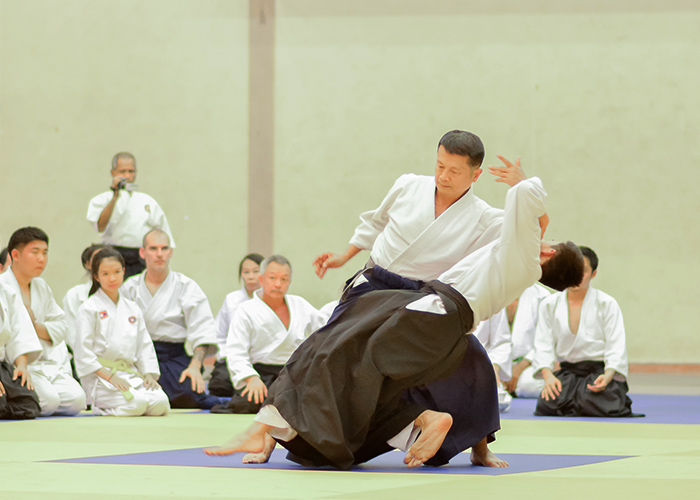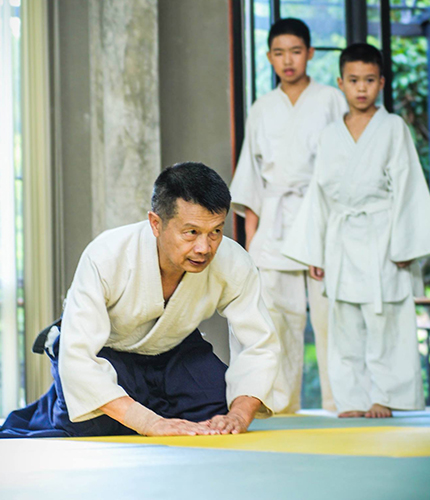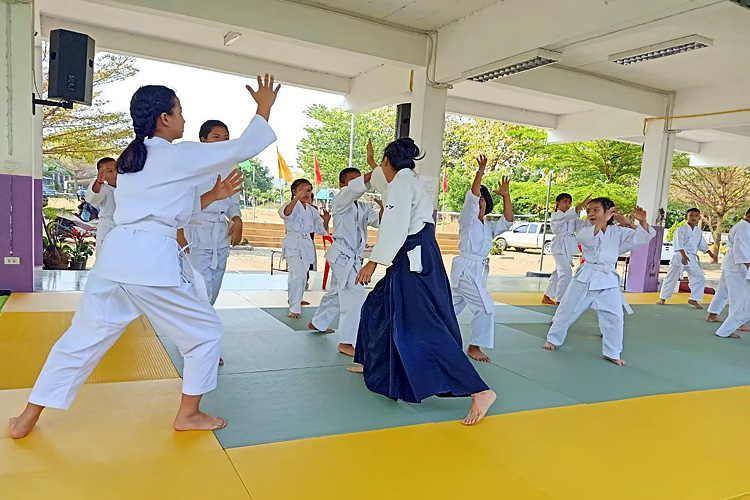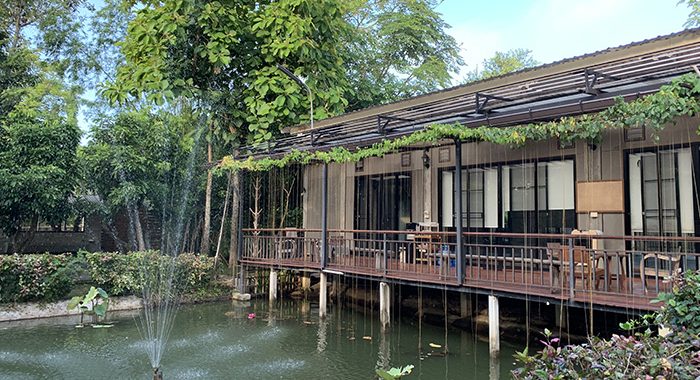The moment you step onto the grounds of the Peace Culture Foundation, you are immediately struck by a distinct feeling of calm and peace.
A pond, with ephemeral pink lotus flowers emerging from the water, is fringed by benches, thus inviting the visitor to reflect and meditate. Beyond the handsome main hall – an interesting blend of northern Thai and Japanese architectural styles - another pond with a spouting water fountain is surrounded by lush vegetation and trees – its stillness punctuated by melodious birdsong, thus compelling the visitor to stop, pause, and take in the tranquility of the natural surroundings.
A desert rose garden with rows of perfectly manicured flowering bushes sits at the entrance to the grounds.
And beautiful rice paddies on the neighbouring plot of land, with their ever shifting shades of shimmering greens, complete the scene.
This physical environment perfectly complements the philosophy and teachings of the centre, where the Japanese martial art of aikido is taught, as well as the persona of the people who run it.
Established in 2016, this little gem tucked away in a corner of Hang Dong village, just outside Chiang Mai, is led by founder, chairperson and aikido instructor Dr. Sombat Tapanya. And the significance of the work that is quietly taking place here cannot be over-emphasised.
“The practice of this martial art extends to every aspect of life,” Dr. Sombat, a retired lecturer in Psychology at Chiang Mai University and therapist, tells me. “We are trying to cultivate an attitude of non-violence and compassion in all kinds of interactions in life.”
A soft-spoken, deep-thinking, highly committed individual who exudes serenity, Dr. Sombat’s comments are peppered with insightful comments about human behaviour, and particularly human aggression.

Aikido instructors Dr. Sombat and Khun Kop.
Aikido instructor and drama specialist at the centre, Ms. Narumol (Kop) Thammapruksa, points out, “Children have to be shown how to cooperate, how to shun name-calling, teasing and bullying, how to take care of others. Aikido teaches them this.”
Both Dr. Sombat and Ms. Kop, as well as other teachers at the centre, volunteer their time, free-of-charge.

WHAT IS AIKIDO?
Aikido was created by the Japanese martial arts master Morihei Ueshiba (1883-1969) in the 1920s and 1930s. A pacifist who lived during World War II, Ueshiba developed this modern form of martial art through a synthesis of older martial arts practices and his personal spiritual philosophy of universal peace and reconciliation.
The word aikido is formed from three Japanese characters: AI indicates the concepts of harmony and unifying. KI indicates energy and spirit. DO indicates the way or path.
Literally, then, aikido is ‘the way of unifying energy’, utilising the tactic of blending with an attacker’s movements to redirect and control his/her actions in a harmless way.
Aikido is based on the principles of non-violence and harmony and focuses on correct movement rather than strength.
The movements in aikido are not designed to stop attacks or to conflict with them. An aikido practitioner blends with the movement of an attacker and redirects it to a conclusion.
Aikido practice develops a calm, relaxed mind and body, an aptitude for self-control and increased self-confidence. Calmness allows for clear perception of conflict situations; and a relaxed body is capable of swift, instinctive response.
Aikido can be practised by persons of all ages and physical abilities who wish to gain flexibility, endurance and balance. Continued study results in physical and mental conditioning, and increased inner strength.
WHAT DOES THE FOUNDATION DO?
With the teaching of aikido at its core, the Peace Culture Foundation conducts peace advocacy programmes in local schools and the wider community. It conducts community outreach programmes, such as art and culture workshops, LibLab Library, Board Games Club and Webinar sessions on such crucial topics as violence against children.
One on-going, three-year project (2020-2023), funded by the Rotary International via the Rotary of Bangkok, is entitled ‘Cultivating A Sustainable Peace Culture in School’. Aikido is taught to mostly Shan primary school children, eventually engendering positive aspects of character, such as non-violence and treating one another with respect and kindness. Training in peer mediation and conflict resolution is important; and workshops on peace building are also held.

The training of parents and teachers associated with the school is a key aspect of this project, as it is recognised that children largely learn violence and aggression by observing adults around them. Hence parents who themselves often were harshly treated and punished need to be taught alternative and non-violent ways to discipline their children. Their training comprises how to introduce positive discipline, how to prevent interpersonal violence and how to prevent bullying.
Another upcoming workshop targets adolescents, teaching them how to recognise and avoid pedophiles. Peer advocacy is part of this endeavour so vital in our present times of widespread in-person and online child sexual abuse. Youth are taught how to pass information onto others, and the dangers of getting involved with pedophiles.
WHY THIS FOUNDATION IS SO IMPORTANT?
My conversation with Dr. Sombat and Khun Kop evolved into a reflection on and examination of human aggression.
Whether aggression and violence are on the rise in the world, or whether we simply have been made more aware of them, is a question for debate. Whether or not humankind is innately aggressive is another.

What we do know, however, is that we are daily and constantly bombarded with images of violence and aggression, through TV, news reports, movies, videos, the Internet, children’s toys (e.g. Playstation) and of course, the ubiquitous smartphone. The short- and long- term impact of all of this on our children (and of course ourselves) is indeed frightening.
“The glorification of violence through the media, kids who in many parts of the world are exposed to aggression every day through the media, through their own physical and mental abuse, through the use of corporal and humiliating punishment, and more – kids are exposed to this, and it is coming from all directions. It leads to the normalisation of aggressive and violent behaviour,” Dr. Sombat stresses.
“We need to train parents and teachers, so that their behaviour towards their children is less aggressive and punitive, so that it is more in line with what aikido teaches” says Khun Kop.
Interestingly, Dr. Sombat, who has done a lot of work surrounding the issue of corporal punishment, notes that parents often feel guilty about the way they treat their children and are grateful to be shown alternative forms of discipline.
“We teach them how to give instructions, how to be specific and how to give positive reinforcement, instead of criticism, negativity and screaming. Of course this means they have to be more attentive to their children and spend more time with them,” he notes.
How a competitive school and societal environment leads to aggression in children is another question of significance. Witness such serious school problems now as hazing and bullying.
Once again aikido presents an alternative. Whereas other martial arts are very competitive and violent, and parents often push their children to compete and excel, aikido does the opposite. There are no competitions, medals or trophies; it is just for parents to appreciate what their children have accomplished as individuals.
“Children have a conception of martial arts as fighting. We start with correcting their attitude,” says Khun Kop.
Adjusting and correcting attitudes and behaviour, in children or adults, is a lifelong pursuit. Change does not usually come easily or quickly. It may take decades - or a lifetime - to witness such change.
Yet what could be more important than teaching our children the values of respect, compassion, harmlessness, non-violence and love, how to bring this into their daily interactions and relationships – now and in their adult lives?
The slow, quiet, steady work of Dr. Sombat, Khun Kop and other volunteer teachers at the Foundation is critical to peace-building in the world, something which we all, in these troubled and troubling times, so desperately need.
For more information go to: www.peaceculturefoundation.org
Copyright Linda Pfotenhauer

Dear Sensei Sombar and Sensei Khun Kop. The work you have done and create this environment for peace and compassion is increddible. Where children and adults can learn the most important values in life.You have my most sincere respect and admiration. I am proud that i was able to be in your dojo’s and enjoy your warm hospitality. Hope to visite you some day again.
Greatings from Paul and Elly de Gruiter.
Allen M. Pfotenhauer
September 13, 2021 at 8:35 pm
Thank you very much, Linda for your most wonderful writing and story about the peace inspiring work and dedication of Sensei Sombar and Sensei Khun Kop. Your writing, Linda, tells the beautiful story of the peace, love, kindness, compassion, and mehta, that these two dedicated practitioners of aikido have been able to create in their dojo and practice of aikido. I learned so very much and feel deeply inspired by your beautiful, exquisite writing and story. Thank you so very much.
Thank you for the interesting insight into the work of this foundation, not far from us!